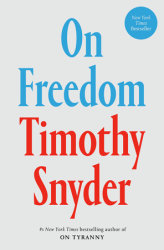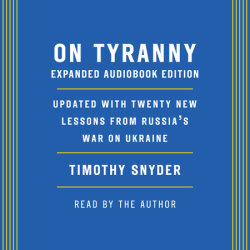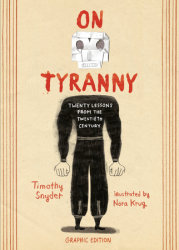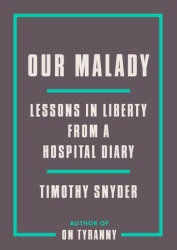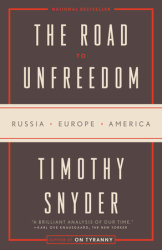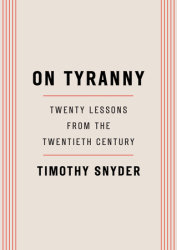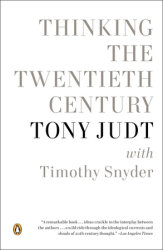To preserve memory of the Holocaust, writes the Czech author Patrik O?edník in Europeana, his haunting deconstruction of the twentieth century, some people, “proposed thirty-nine steel posts on which WHY? would be written in various languages, WARUM?, WAAROM?, VARFØR?, PRO??, POURQUOI?, PERCHÉ?, DLACZEGO?, C?R?, KUIDA?, MIKSI?, MIÉRT?, ZAKAJ?, KOD?L?, HVORFOR?, JIATÍ, PSE?, NIÇIN?, etc.”
It’s a question that suffuses Timothy Snyder’s new book Black Earth: The Holocaust as History and Warning, as it has suffused much writing on World War II. But Snyder’s book also centers on another paramount question: “What?”
The Holocaust has typically been seen as an infernal alchemy of indigenous anti-Semitism and the totalitarian Nazi state, a singular event that killed millions of Jews in a few years. Yet, Snyder argues that what allowed the Holocaust to be so bloody was the double destruction of states, first by the Soviet Union, then by the Nazis. It was then coupled with Hitler’s maniacal obsession with an impending resource crisis, his worldview that races are species whose natural state is one of competition, and his belief that the Jews were a non-race who’d upset the natural order and, in doing so, jeopardized the Aryan right to supremacy. It’s an enlivening, if controversial, historical formulation.
As the title says, Snyder intends his book not just as a description of the past, but a what-if for the future. Over e-mail recently he answered a few questions about the conditions that led to the Holocaust and the possibility of similar conditions returning today.
PENGUIN RANDOM HOUSE: How necessary is pre-existing prejudice against a group like the Jews in carrying out an act of genocide?
Timothy Snyder: Very often pre-existing anti-Semitism is invoked as the explanation for the Holocaust. I think we have to be very careful with this, since it can lead us to underestimate the significance of dangerous ideas.
Germany was certainly not the country where anti-Semitic ideas were most popular in the 1920s, yet Germany produced a National Socialist government. The Netherlands was generally seen, then as now, as a tolerant country; but seventy-five percent of its Jews were murdered. France was regarded, then as now, as a more anti-Semitic country, but seventy-five percent of its Jews survived. Ninety-nine percent of the Jews of Denmark survived while ninety-nine percent of the Jews in Estonia were murdered; there is simply no way that anti-Semitism explains this difference. The Soviet Union devoted a great deal of energy to fighting anti-Semitism, and yet Soviet citizens were the vast majority of the direct collaborators in the Holocaust.
The case that I would want to make is that Hitlerian anti-Semitism is special, in that it blames the Jews for everything that Hitler regarded as evil, and demands their extermination wherever possible. That program could only be realized insofar as normal state institutions were destroyed. When Germany entered the Soviet Union, it found some people who really believed that Jews were communists and communists were Jews. But the vast majority of the population knew that this was not true, since they knew that they themselves had taken part in the Soviet system. For them, blaming Jews for communism was a way to expiate historical responsibility and to collaborate with the new authorities. Prewar anti-Semitism certainly mattered at times, but what we should be concerned about is the rapidity with which people can gravitate to an idea that seems to provide an escape.
PRH: As I was reading the book, I couldn’t help but think of the rhetoric we’ve been hearing at the beginning of this presidential election cycle against Latin Americans. The heart of the anti-immigrant rhetoric often seems to be an economic fear, which doesn’t seem like a concern that far from Hitler’s concern of Lebensraum. Do you feel there is a similar risk with such rhetoric? Are the pressures precipitating it similar? If so, what can we do?
TS: Lebensraum is a very modern idea, and indeed it’s one that is not as far away from us as we might want or might think. On the one hand, it means “habitat:” the world is divided into ecological niches, and it is natural that one race takes land from another and starves the original inhabitants to death. On the other hand, the word also means “living room” in the sense of a comfortable home. All of those people have to suffer and die far away not exactly so that the race can survive, but rather so that the race can be comfortable. Life is confused with lifestyle.
In the election campaign, though, the thing that bothers me is something else: that we in America and Europe in developed countries generally wreak havoc by causing climate change, and then denigrate people who, quite naturally, want to come north. We change the world for our own comfort, and then blame other people when they suffer as a result.
PRH: Even if we are able to overcome climate change denial, you seem to predict a particularly horrific scenario if the world ever arrives at a Malthusian dilemma. What happens when science ultimately fails us?
TS: I’m not so afraid of a pure resource crisis. I am more afraid of a politics where the leaders of a developed country, like Hitler in the 1930s, exploit very real ecological anxieties to justify immediate aggression. As climate change gets worse, I fear that this becomes ever more likely. Science won’t fail us; but so far we are failing science.
BIOG: You point to a contemporary cultural fascination with doom and anarchy. Is there danger in this? If so, what is it? How powerful or significant are these cultural ideas?
TS: I am not an especially good judge of the popular mood and I am not a student of contemporary culture. I agree that fatalism is quite dangerous, because it can prevent decisive action at the moment when a catastrophe could still be averted. The connection with the Nazi period here is fairly obvious: Hitler said that catastrophe was permanent and natural and to be accepted, and that all that mattered was seizing as much as possible for the race. Once we accept that catastrophe is reality, it is hard to believe in science or ethics or any other concept that allows for human reciprocity and constructive institutions.








